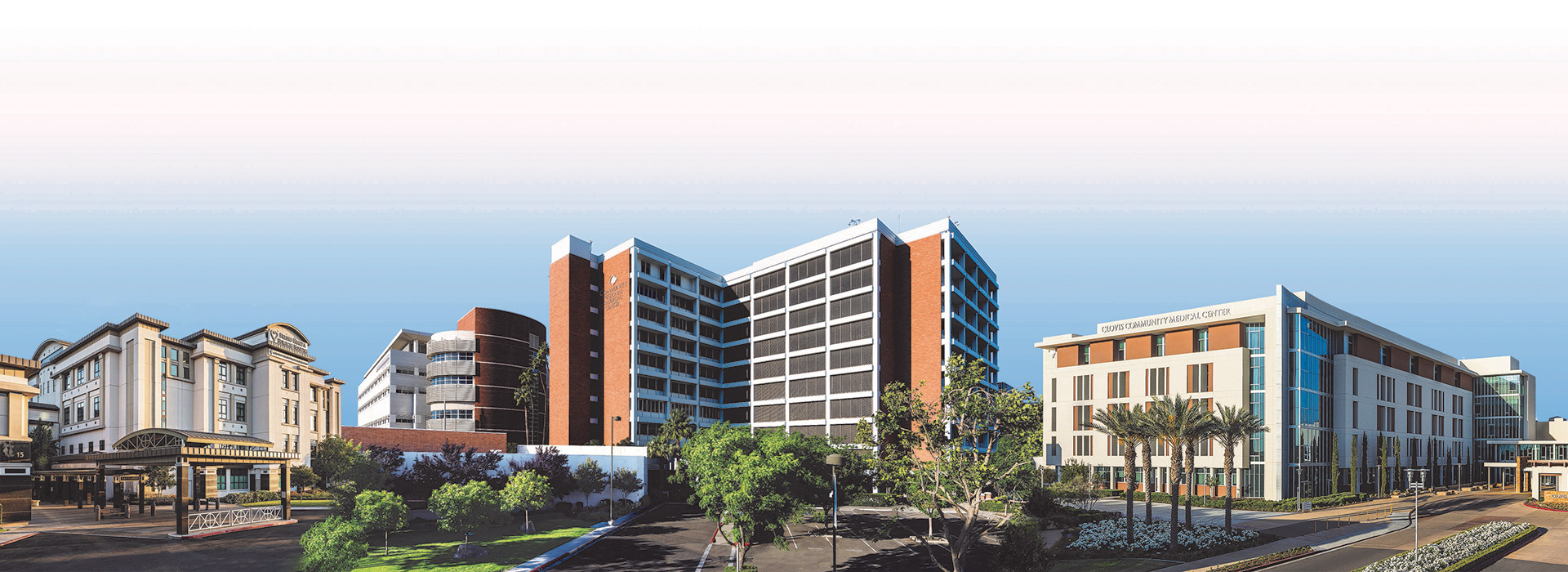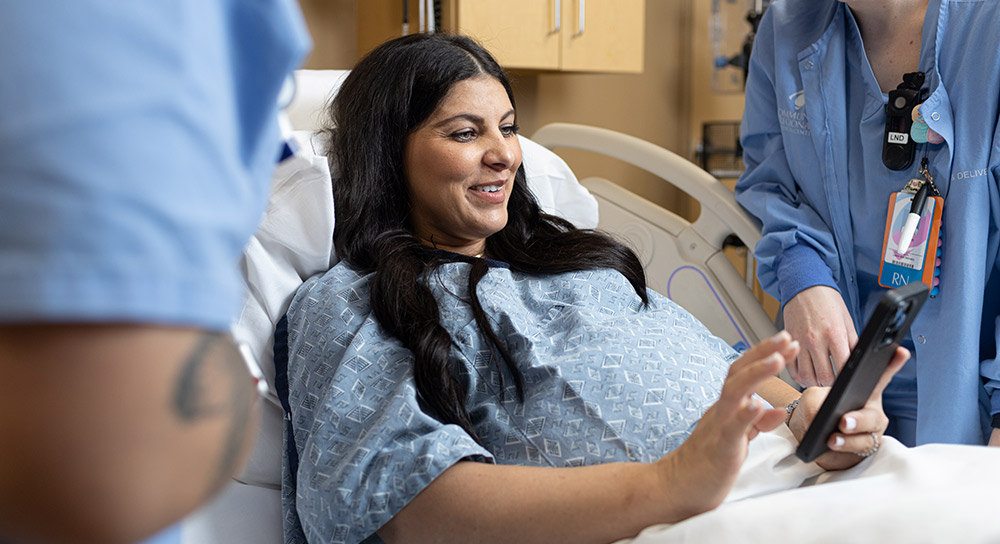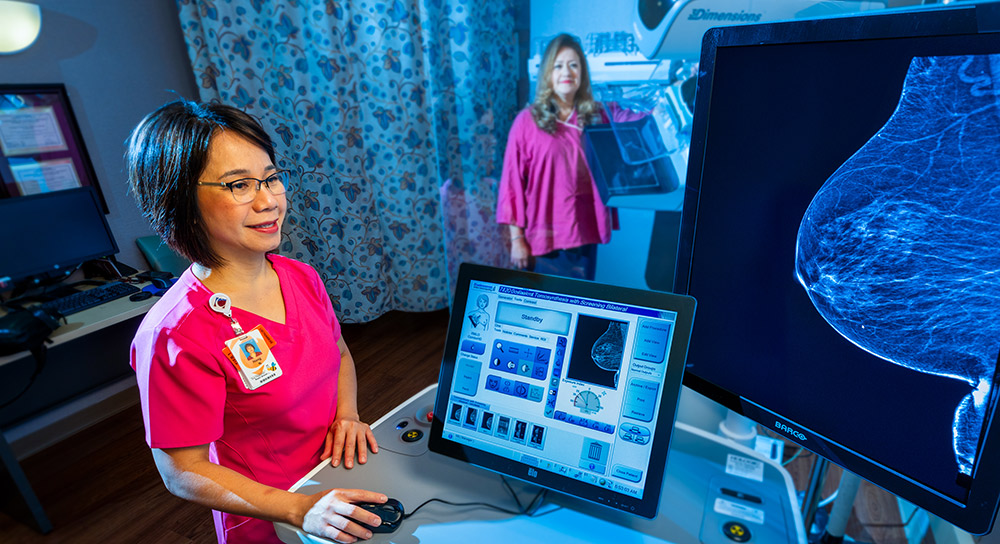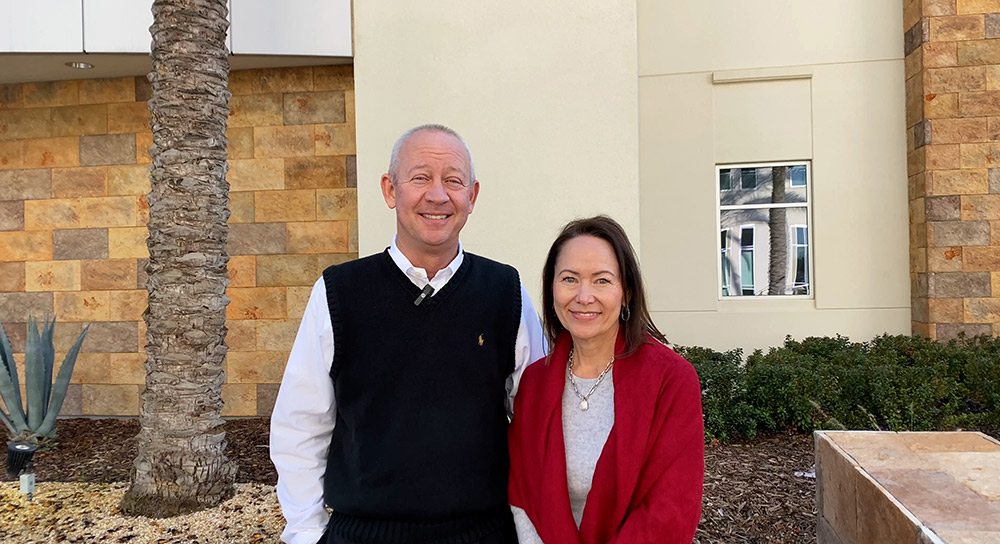 Joseph Leonard is back to work after being diagnosed with prostate cancer and having special robotic surgery by urologist Dr. Yuk-Yuen Leung at Community Regional Medical Center – one of the first hospitals in California to offer the da Vinci Surgical System®- a minimally invasive robotic technology that is an alternative to traditional surgery and conventional laparoscopy. Leonard shared his experience on Healthcare Heroes, a nationally syndicated television show, filmed exclusively at Community Medical Centers’ facilities.
Joseph Leonard is back to work after being diagnosed with prostate cancer and having special robotic surgery by urologist Dr. Yuk-Yuen Leung at Community Regional Medical Center – one of the first hospitals in California to offer the da Vinci Surgical System®- a minimally invasive robotic technology that is an alternative to traditional surgery and conventional laparoscopy. Leonard shared his experience on Healthcare Heroes, a nationally syndicated television show, filmed exclusively at Community Medical Centers’ facilities.
Leonard is thrilled with his progress and was back to work full-time in five weeks. He knows eight men who had similar surgeries, but none of them had a prostatectomy using the da Vinci surgical system.
“Compared to my friends, my experience was like night and day,” said Leonard, who was released from the hospital the day after his surgery. “I’ve had teeth cleanings that were worse than this.”
Leonard is dealing with incontinence, which he said Dr. Leung told him to expect after prostatectomy surgery. Otherwise, he said he feels great. Dr. Leung performed Leonard’s prostatectomy and he took some time to answer a few questions about prostate cancer and the da Vinci prostatectomy:
Q. What is your reaction to the new American Medical Association (AMA) screening guidelines in general?
A. I agree that there are complex issues involved in prostate cancer screening. It may sometimes be difficult to determine the aggressiveness of a patient's prostate cancer based on prostate-specific antigen (PSA) or biopsy information alone. The new guidelines state that the patient be more involved in the decision-making process for prostate cancer screening, understand the pros, cons, potential benefits and side effects of diagnosing and treating prostate cancer. This is a good idea with all health care decisions anyway.
There are several different organizations and bodies that make seemingly different recommendations with regard to prostate cancer screening. Some of the recommendations are made based on shorter term research studies that may not suggest significant difference in survival over a five to 10 year period. However, knowing that prostate cancer is a slow-growing cancer, longer term studies may still ultimately show benefits in early diagnosis and treatment for patients that have a life expectancy of more than 15 years. More definitive data showing the benefit of early diagnosis and treatment may become available in the future once these large studies mature.
Generally speaking, screening should still be beneficial for patients that have a long life expectancy of more than 15 years, for patients with a family history of prostate cancer or for patients in other high risk groups. Although the American Cancer Society states that a digital rectal exam should be optional, I (along with the American Urological Association) believe it should still be used as a tool in conjunction with PSA testing. Instead of relying only on a single PSA value, the speed of the rise of PSA over a period of time may be a more useful tool in determining whether or not a patient is at risk for prostate cancer.
Q. Is there ever an instance when the da Vinci technology can't be used for a prostatectomy?
A. Any patients that are good surgical candidates should be candidates for da Vinci robotic prostatectomy. Da Vinci prostatectomy may be more challenging for patients that have extensive multiple prior abdominal surgeries or for patients that are morbidly obese. However, we have successfully performed many da Vinci robotic prostatectomies on these types of patients.
Q. Da Vinci benefits to the patient vs. open surgery
A. Da Vinci prostatectomy is a form of minimally invasive laparoscopic surgery, so the recovery process is much simpler and easier for patients. We know for sure that da Vinci prostatectomy has less pain, a shorter hospital stay and less bleeding. Yet in the hands of an experienced robotic surgeon, cancer control and ultimate outcome should be at least similar, if not superior, to open prostatectomy. Due to better precision and visualization, there may also be the potential benefit of better preservation of the urinary sphincter for urine control and for saving neurovascular tissue to preserve erectile function.
Q. How important is the spouse's role in making sure men get in for their checkups?
A. The spouse's role is critical in the recovery of a patient that has just undergone the da Vinci prostatectomy. I try to involve the spouse in every step of the treatment process – from diagnosis and decision making for treatment options to eventual recovery. When patients feel supported by their families, they are more motivated to follow the treatment protocol and thus hopefully have better outcomes.
Q. How important is it to know your family history when talking about prostate cancer?
A. It is critical to know and understand a patient's health and family history when we diagnose and treat prostate cancer. We would treat much more aggressively if we know a patient has a strong family history of prostate cancer, especially if we know a family member died from the disease. It means that their prostate cancer may be more aggressive genetically.
Q. Does prostate cancer screening save lives?
A. If you target the screening test to the right population, it should save lives. I am talking about patients that are young, otherwise healthy with a rapidly rising PSA or for patients with a strong family history of prostate cancer. I don't believe it is useful to screen for prostate cancer in patients that are more than 80-years-old without any urinary symptoms or for patients that have a short life expectancy due to other medical problems. Before the use of screening tools for prostate cancer, urologists used to treat many patients with late-stage prostate cancer that had already spread (when they became symptomatic). However, these patients are not as commonly encountered these days, despite the fact the population is getting older. This is probably due to early detection with prostate cancer screening.
Q. What questions should you ask your doctor before having surgery, if you do need to have surgery?
A. You want to make sure that you understand all the treatment options. You should understand all the potential risks and benefits, surgery expectations and the recovery process. You want to ask how many prostatectomy surgeries your doctor performs every year. We know that the surgical outcome is always better with a high volume surgeon at a high volume hospital.
Q. What are the side effects of treatment?
A. As with any major operation, da Vinci prostatectomy does come with a small risk for bleeding, infection, injury, scarring, anesthesia reactions and cardiovascular complications. These types of immediate intraoperative or postoperative complications are rare and occur less than 1% of the time. Other side effects that almost every patient will experience for a variable length of time include urinary control problems and erectile dysfunction. For the majority of patients (less than 95% of the time), urine control returns within six months to one year. More than 70% of the time, erectile function improves to close to baseline in one to two years.
This story was reported by MedWatch Today staff. The staff can be reached at MedWatchToday@communitymedical.org.





